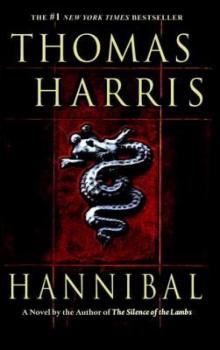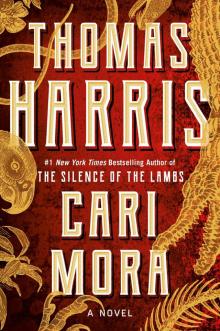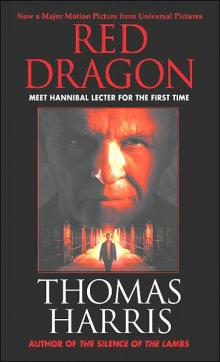- Home
- Thomas Harris
Hannibal Rising
Hannibal Rising Read online
Before
HANNIBAL
Before
THE SILENCE OF THE LAMBS
Before
RED DRAGON …
Human scavengers, the savage hyenas of war, prowled the Eastern Front. This child survived them. He stands in the snow, utterly alone before the advancing tanks, bullets kicking up the snow around him. The landscape of his mind is stranger than the blasted and burning forest around him, the atmosphere a bloody mist.
Watch him as he becomes
Dr. Hannibal Lecter, M.D.
Also by Thomas Harris
BLACK SUNDAY
RED DRAGON
THE SILENCE OF THE LAMBS
HANNIBAL
PROLOGUE
THE DOOR TO DR. HANNIBAL LECTER’S memory palace is in the darkness at the center of his mind and it has a latch that can be found by touch alone. This curious portal opens on immense and well-lit spaces, early baroque, and corridors and chambers rivaling in number those of the Topkapi Museum.
Everywhere there are exhibits, well-spaced and lighted, each keyed to memories that lead to other memories in geometric progression.
Spaces Devoted To Hannibal Lecter’s earliest years differ from the other archives in being incomplete. Some are static scenes, fragmentary, like painted Attic shards held together by blank plaster. Other rooms hold sound and motion, great snakes wrestling and heaving in the dark and lit in flashes. Pleas and screaming fill some places on the grounds where Hannibal himself cannot go. But the corridors do not echo screaming, and there is music if you like.
The palace is a construction begun early in Hannibal’s student life. In his years of confinement he improved and enlarged his palace, and its riches sustained him for long periods while warders denied him his books.
Here in the hot darkness of his mind, let us feel together for the latch. Finding it, let us elect for music in the corridors and, looking neither left nor right, go to the Hall of the Beginning where the displays are most fragmentary.
We will add to them what we have learned elsewhere, in war records and police records, from interviews and forensics and the mute postures of the dead. Robert Lecter’s letters, recently unearthed, may help us establish the vital statistics of Hannibal, who altered dates freely to confound the authorities and his chroniclers. By our efforts we may watch as the beast within turns from the teat and, working upwind, enters the world.
I
This is the first thing
I have understood:
Time is the echo of an axe
Within a wood.
—PHILIP LARKIN
1
HANNIBAL THE GRIM (1365-1428) built Lecter Castle in five years, using for labor the soldiers he had captured at the Battle of Žalgiris. On the first day his pennant flew from the completed towers, he assembled the prisoners in the kitchen garden and, mounting his gallows to address them, he released the men to go home, just as he had promised. Many elected to stay in his service, owing to the quality of his provender.
Five hundred years later Hannibal Lecter, eight years old and eighth of the name, stood in the kitchen garden with his little sister Mischa and threw bread to the black swans on the black water of the moat. Mischa held on to Hannibal’s hand to steady herself and missed the moat entirely on several throws. Big carp stirred the lily pads and sent the dragonflies soaring.
Now the Alpha swan came out of the water, stumping toward the children on his short legs, hissing his challenge. The swan had known Hannibal all his life and still he came, his black wings shutting out part of the sky.
“Ohh, Anniba!” Mischa said and hid behind Hannibal’s leg.
Hannibal raised his arms to shoulder height as his father had taught him to do, his reach augmented with willow branches held in his hands. The swan stopped to consider Hannibal’s greater wingspan, and retired to the water to feed.
“We go through this every day,” Hannibal told the bird. But today was not every day and he wondered where the swans could flee.
Mischa in her excitement dropped her bread on the damp ground. When Hannibal stooped to help her, she was pleased to daub mud on his nose with her little star-shaped hand. He daubed a bit of mud on the end of her nose and they laughed at their reflections in the moat.
The children felt three hard thumps in the ground and the water shivered, blurring their faces. The sound of distant explosions rolled across the fields. Hannibal grabbed up his sister and ran for the castle.
The hunting wagon was in the courtyard, hitched to the great draft horse Cesar. Berndt in his hostler’s apron and the houseman, Lothar, loaded three small trunks into the wagon box. Cook brought out a lunch.
“Master Lecter, Madame wants you in her room,” Cook said.
Hannibal passed Mischa along to Nanny and ran up the hollowed steps.
Hannibal loved his mother’s room with its many scents, the faces carved in the woodwork, its painted ceiling—Madame Lecter was of the Sforza on one side and a Visconti on the other, and she had brought the room with her from Milan.
She was excited now and her bright maroon eyes reflected the light redly in sparks. Hannibal held the casket as his mother pressed the lips of a cherub in the molding and a hidden cabinet opened. She scooped her jewels into the casket, and some bundled letters; there was not room for them all.
Hannibal thought she looked like the cameo portrait of her grandmother that tumbled into the box.
Clouds painted on the ceiling. As a baby nursing he used to open his eyes and see his mother’s bosom blended with the clouds. The feel of the edges of her blouse against his face. The wet nurse too—her gold cross gleamed like sunlight between prodigious clouds and pressed against his cheek when she held him, she rubbing the mark of the cross on his skin to make it go away before Madame might see it.
But his father was in the doorway now, carrying the ledgers.
“Simonetta, we need to go.”
The baby linens were packed in Mischa’s copper bathtub and Madame put the casket among them. She looked around the room, and took a small painting of Venice from its tripod on the sideboard, considered a moment, and gave it to Hannibal.
“Take this to Cook. Take it by the frame.” She smiled at him. “Don’t smudge the back.”
Lothar carried the bathtub out to the wagon in the courtyard, where Mischa fretted, uneasy at the stir around her.
Hannibal held Mischa up to pat Cesar’s muzzle. She gave the horse’s nose a few squeezes as well to see if it would honk. Hannibal took grain in his hand and trailed it on the ground in the courtyard to make an “M.” The pigeons flocked to it, making an “M” in living birds on the ground. Hannibal traced the letter in Mischa’s palm—she was approaching three years old and he despaired of her ever learning to read. “‘M’ for Mischa!” he said. She ran among the birds laughing and they flew up around her, circling the towers, lighting in the belfry.
Cook, a big man in kitchen whites, came out carrying a lunch. The horse rolled an eye at Cook and followed his progress with a rotating ear—when Cesar was a colt, Cook had run him out of the vegetable garden on a number of occasions, yelling oaths and swatting his rump with a broom.
“I’ll stay and help you load the kitchen,” Mr. Jakov said to Cook.
“Go with the boy,” Cook said.
Count Lecter lifted Mischa into the wagon and Hannibal put his arms around her. Count Lecter cupped Hannibal’s face in his hand. Surprised by the tingle in his father’s hand, Hannibal looked closely into Count Lecter’s face.
“Three planes bombed the rail yards. Colonel Timka says we have at least a week, if they reach here at all, and then the fighting will be along the main roads. We’ll be fine at the lodge.”
It was the second day of Operation Barbarossa,
Hitler’s lightning sweep across Eastern Europe into Russia.
2
BERNDT WALKED AHEAD of the wagon on the forest path, careful of the horse’s face, hacking back the overgrown branches with a Swiss half-pike.
Mr. Jakov followed on a mare, his saddlebags full of books. He was unused to horseback and he hugged the horse’s neck to pass beneath the limbs. Sometimes where the trail was steep, he dismounted to push along with Lothar and Berndt and Count Lecter himself. Branches snapped back behind them to close the trail again.
Hannibal smelled greenery crushed by the wheels and Mischa’s warm hair beneath his chin as she rode on his lap. He watched the German bombers pass over high. Their vapor trails made a musical staff and Hannibal hummed to his sister the notes the black puffs of flak made in the sky. It was not a satisfying tune.
“No,” Mischa said. “Anniba sing ‘Das Mannlein’!” And together they sang about the mysterious little man in the woods, Nanny joining in in the swaying wagon and Mr. Jakov singing from horseback, though he preferred not to sing in German.
Ein Mannlein steht im Walde ganz still und stumm,
Es hat von lauter Purpur ein Mantlein um,
Sagt, wer mag das Mannlein sein
Das da steht im Walde allein
Mit dem purporroten Mantelein—
Two hard hours brought them to a clearing beneath the canopy of the high forest.
The hunting lodge had evolved over three hundred years from a crude shelter into a comfortable forest retreat, half-timbered with a steep roof to shed the snow. There was a small barn containing two stalls and a bunkhouse and, behind the lodge, a Victorian privy with gingerbread carvings, its roof just visible over the screening hedge.
Still visible in the foundations of the lodge are the stones of an altar built in the Dark Ages, by a people who venerated the grass snake.
Now Hannibal watched a grass snake flee that ancient place as Lothar cut back some vines so Nanny could open windows.
Count Lecter ran his hands over the big horse while it drank a gallon and a half from the well bucket. “Cook will have the kitchen packed by the time you get back, Berndt. Cesar can rest in his own stall overnight. You and Cook start back here at first light, no later. I want you well clear of the castle by morning.”
Vladis Grutas entered the courtyard of Lecter Castle with his most pleasant expression, scanning the windows as he came. He waved and called out “Hello!”
Grutas was a slight figure, dirty blond, in civilian clothes, with eyes so pale and blue they looked like discs of the empty sky. He called out “Hello in the house!” When there was no reply he went in the kitchen entrance and found cases of supplies packed on the kitchen floor. Quickly he put coffee and sugar in his pack. The cellar door was open. He looked down the long stairs and saw a light.
Violating another creature’s den is the oldest taboo. To certain warps, slipping in offers the freezing feeling of arousal, as it did now.
Grutas went down the staircase into the cool cave air of the castle’s vaulted dungeons. He peered through an arch and saw that the iron grate securing the wine room was open.
A rustling noise. Grutas could see labeled wine racks floor to ceiling filled with bottles and the cook’s big shadow moving around the room as he worked by the light of two lanterns. Square wrapped packages were on the tasting table in the center of the room and, with them, a single small painting in an ornate frame.
Grutas showed his teeth when that big bastard of a cook came into view. Now the cook’s wide back was to the door as he worked over the table. A rustling of paper.
Grutas flattened himself against the wall in the shadow of the steps.
The cook wrapped the painting in paper and wrapped it in kitchen string, making a parcel like the others. With a lantern in his free hand, he reached up and pulled on an iron chandelier above the tasting table. A click and at the back of the wine cellar one end of a wine rack swung a few inches away from the wall of the room. Cook swung the rack away from the wall with a groan of hinges. Behind it was a door.
Cook went into the concealed room behind the wine cellar and hung one of his lanterns back there. Then he carried the parcels inside.
As he was swinging the wine rack closed, his back to the door, Grutas started up the steps. He heard a shot fired outside, and then the cook’s voice below him.
“Who’s that!”
Cook came behind him, fast on the stairs for a big man.
“Stop you! You were never to come here.”
Grutas ran through the kitchen and into the courtyard waving and whistling.
Cook grabbed a stave from the corner and ran across the kitchen toward the courtyard when he saw a silhouette in the doorway, an unmistakable helmet shape, and three German paratroopers with submachine guns came into the room. Grutas was behind them.
“Hi, Cookie,” Grutas said. He picked up a salted ham from the crate on the floor.
“Put back the meat,” the German corporal said, pointing his weapon at Grutas as readily as he did at the cook. “Get outside, go with the patrol.”
The trail was easier descending to the castle, Berndt making good time with the empty wagon, wrapping the reins around his arm while he lit his pipe. As he approached the edge of the forest he thought he saw a big stork taking off from high in a tree. As he got closer he saw the flapping white was fabric, a parachute caught in high limbs, the risers cut. Berndt stopped. He put down his pipe and slid off the wagon. He put his hand over Cesar’s muzzle and spoke quietly into the horse’s ear. Then he moved forward on foot, cautious.
Suspended from a lower limb was a man in rough civilian clothes, newly hanged with the wire noose well into his neck, his face blue-black, his muddy boots a foot above the ground. Berndt turned back fast toward the wagon, looking for a place to turn around on the narrow trail, his own boots looking strange to him as he found footing on the rough ground.
They came out of the trees then, three German soldiers under a sergeant and six men in civilian clothes. The sergeant considered, drew back the bolt of his machine pistol. Berndt recognized one of the civilians.
“Grutas,” he said.
“Berndt, goody Berndt, who always got up his lessons,” Grutas said. He walked up to Berndt with a smile that seemed friendly enough.
“He can handle the horse,” Grutas said to the German sergeant.
“Maybe he is your friend,” the sergeant said.
“Maybe not,” Grutas said, and spit in Berndt’s face. “I hung the other one, didn’t I? I knew him too. Why should we walk?” And softly, “I’ll shoot him at the castle if you will lend me back my gun.”
3
BLITZKRIEG, HITLER’S lightning war, was faster than anyone imagined. At the castle Berndt found a company of the Totenkopf Death’s Head Division, Waffen-SS. Two Panzer tanks were parked near the moat with a tank destroyer and some half-track trucks.
The gardener Ernst lay facedown in the kitchen yard with blowflies on his head.
Berndt saw this from the wagon box. Only the Germans rode in his wagon. Grutas and the others had to walk behind. They were only Hilfswillige, or Hiwis, locals who volunteered to help the invading Nazis.
Berndt could see two soldiers, high on a tower of the castle, running down the Lecters’ wild-boar pennant and putting up a radio aerial and a swastika flag in its place.
A major wearing SS black and the Totenkopf skull insignia came out of the castle to look at Cesar.
“Very nice, but too wide to ride,” he said regretfully—he had brought his jodhpurs and spurs to ride for recreation. The other horse would do. Behind him two storm troopers came out of the house, hustling Cook along between them.
“Where is the family?”
“In London, sir,” Berndt said. “May I cover Ernst’s body?”
The major motioned to his sergeant, who stuck the muzzle of the Schmeisser under Berndt’s chin.
“And who will cover yours? Smell the barrel. It’s still smoking. It can bl
ow your fucking brains out too,” the major said. “Where is the family?”
Berndt swallowed. “Fled to London, sir.”
“Are you a Jew?”
“No, sir.”
“A Gypsy?”
“No, sir.”
He looked at a wad of letters from a desk in the house. “There is mail for a Jakov. Are you the Jew Jakov?”
“A tutor, sir. Long gone.”
The major checked Berndt’s earlobes to see if they were pierced. “Show the sergeant your dick.” Then, “Shall I kill you or will you work?”
“Sir, these people all know each other,” the sergeant said.
“Is that so? Perhaps they like each other.” He turned to Grutas. “Perhaps your fondness for your landsmen is more than you love us, hem, Hiwis?” The major turned to his sergeant. “Do you think we really need any of them?” The sergeant leveled the gun at Grutas and his men.
“The cook is a Jew,” Grutas said. “Here is useful local knowledge—you let him cook for you, you would be dead within the hour from Jew poison.” He pushed forward one of his men. “Pot Watcher can cook, and forage and soldier too.”
Grutas went to the center of the courtyard, moving slowly the muzzle of the sergeant’s machine pistol tracking him. “Major, you wear the ring and the scars of Heidelberg. Here is military history of the kind you yourself are making. This is the Ravenstone of Hannibal the Grim. Some of the most valiant Teutonic Knights died here. Is it not time to wash the stone with Jew blood?”
The major raised his eyebrows. “If you want to be SS, let’s see you earn it.” He nodded to his sergeant. The SS sergeant took a pistol from his flap holster. He shucked all the bullets but one from the clip and handed the pistol to Grutas. Two storm troopers dragged the cook to the Ravenstone.
The major seemed more interested in examining the horse. Grutas held the pistol to the cook’s head and waited, wanting the major to watch. Cook spit on him.

 The Silence of the Lambs
The Silence of the Lambs Red Dragon
Red Dragon Hannibal
Hannibal Black Sunday
Black Sunday Cari Mora
Cari Mora Hannibal Rising
Hannibal Rising Red Dragon hl-1
Red Dragon hl-1 The Silence of the Lambs (Hannibal Lecter)
The Silence of the Lambs (Hannibal Lecter)